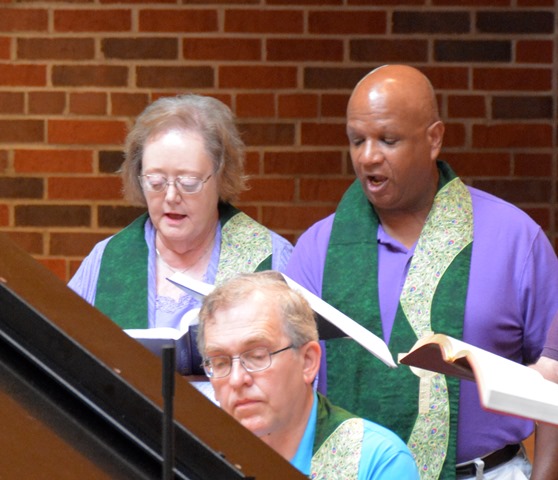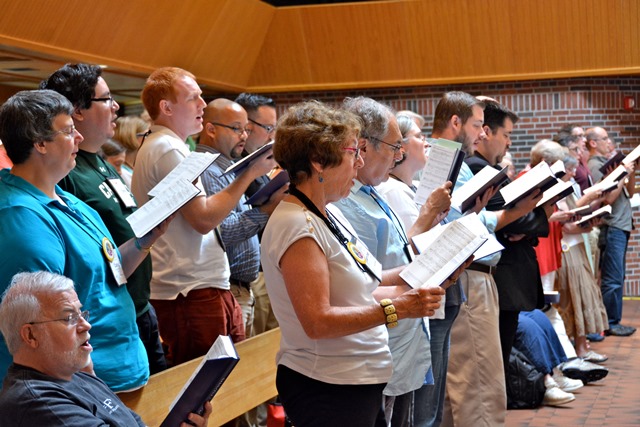By Jeff Brumley
Those still in shock from last week’s terrorist attacks in Paris and other places should try joining others in song, Deborah Carlton Loftis says.
Ditto, she adds, for those grieving the sudden death of a church member, struggling through a natural disaster or suffering through life-threatening illnesses in themselves or loved ones.
“We believe that singing together is a powerful thing to do,” said Loftis, executive director of the Hymn Society in the United States and Canada. “It promotes healing, it connects people to each other and connects them to their faith.”

And those connections, she said, provide the channels of peace that can aid the human mind and soul in recovery, whether from man-made or natural disasters.
Hymns on short notice
It was with that healing in mind that the Hymn Society recently launched an online resource of downloadable hymns tailor-made for individuals, congregations and even nations experiencing pain and suffering major trauma.
“Hymns in Times of Crisis” is a free collection of about 55 relatively new pieces designed to be performed and sung to the tune of more familiar, popular hymns, Loftis said.
Going that route prevents grieving congregations, and sometimes their choirs, from having to learn new music in the traumatic hours following an event like 9-11, Hurricane Katrina or a mass school shooting, she added.

The collection can be downloaded and used for two months without concern for copyright infringements. Plus, the music can be used again, if needed, one year later for commemoration services, Loftis said.
“Usually the need will come on pretty short notice,” she said. “After the attacks in Paris, if a church wanted to have a prayer vigil, they could do that in 24 hours.”
It’s also meant for ease of use.
“The collection is focused on text and can be sung with familiar tunes,” she said. “It can be used for individual devotions and for group discussions.”
‘A mystical power’
The project began after years that saw society staff members scrambling to fill the sudden and immediate needs of individuals and churches looking for hymn selections tailored to tragic events, said John Ambrose, immediate past-president of the Hymn Society.
The time had come by the summer of 2014, Ambrose said, to establish an online collection on a wide range of crisis subjects. An advisory group was established to vet hymns for appropriateness and copyright availability.
By that August, the group had received 270 submissions.
“We never dreamed they would come in such numbers,” Ambrose said.
The topics are numerous. They range from dementia, Alzheimer’s and justice to ecological damage, personal loss and violence — including acts of terrorism and feelings of rejection.

In addition to the topics, the team created indexes of meter and tune, providing suggested music to accompany each hymn. That’s why the collection was whittled down to under 60, he said.
A team is currently working to expand the collection, he added.
It’s a collection that will not be familiar to many.
“These are fairly newly written hymns which have not appeared in hymnals” because “they were just too specific in their targeted content,” Ambrose said.
But the hymns are powerful because they express powerful emotions surrounding terrible tragedies, he said.
“There is almost mystical power in giving voice through song to power,” he said. “It makes people feel they have given themselves to a crisis” in a way that the spoken or written word cannot.
Helping people grieve
Loftis said she can testify to that.
“There was a time in my life when I experienced great loss and there were hymns that carried me through,” she said.
That loss came on Oct. 30, 1993, when her husband and daughter were killed in an automobile accident.
One of the hymns during the memorial service was “Great is They Faithfulness.”
“In the months that followed, I found myself going back to it over and over, especially the line ‘strength for today and bright hope for tomorrow,’” Loftis said. “That phrase became an anchor for me to keep moving forward.”
The Hymn Society’s new crisis collection isn’t meant to replace traditional hymns, Loftis said, because they certainly can express grief and longing and joy in general ways.

“The older texts deal with comfort and care, but don’t address the particular issues,” she said. So the idea is to encourage congregations to keep their favorites while using “the newer texts alongside to express the doubt and pain.”
Loftis said she used hymns from the collection in that way in October after the Umpqua Community College shootings in Oregon.
The two-month, copyright-free time period gave her flexibility to plan the event.
“Because we conceived of this resource being used for a time of crisis and on fairly short notice, we wanted to make things available with no barriers,” she said.
“Whether it’s an act of terrorism, a disaster, a hurricane, or sudden death in a family or congregation … having a service that brings the congregation together is a very important action to help them grieve and undergird one another.”
